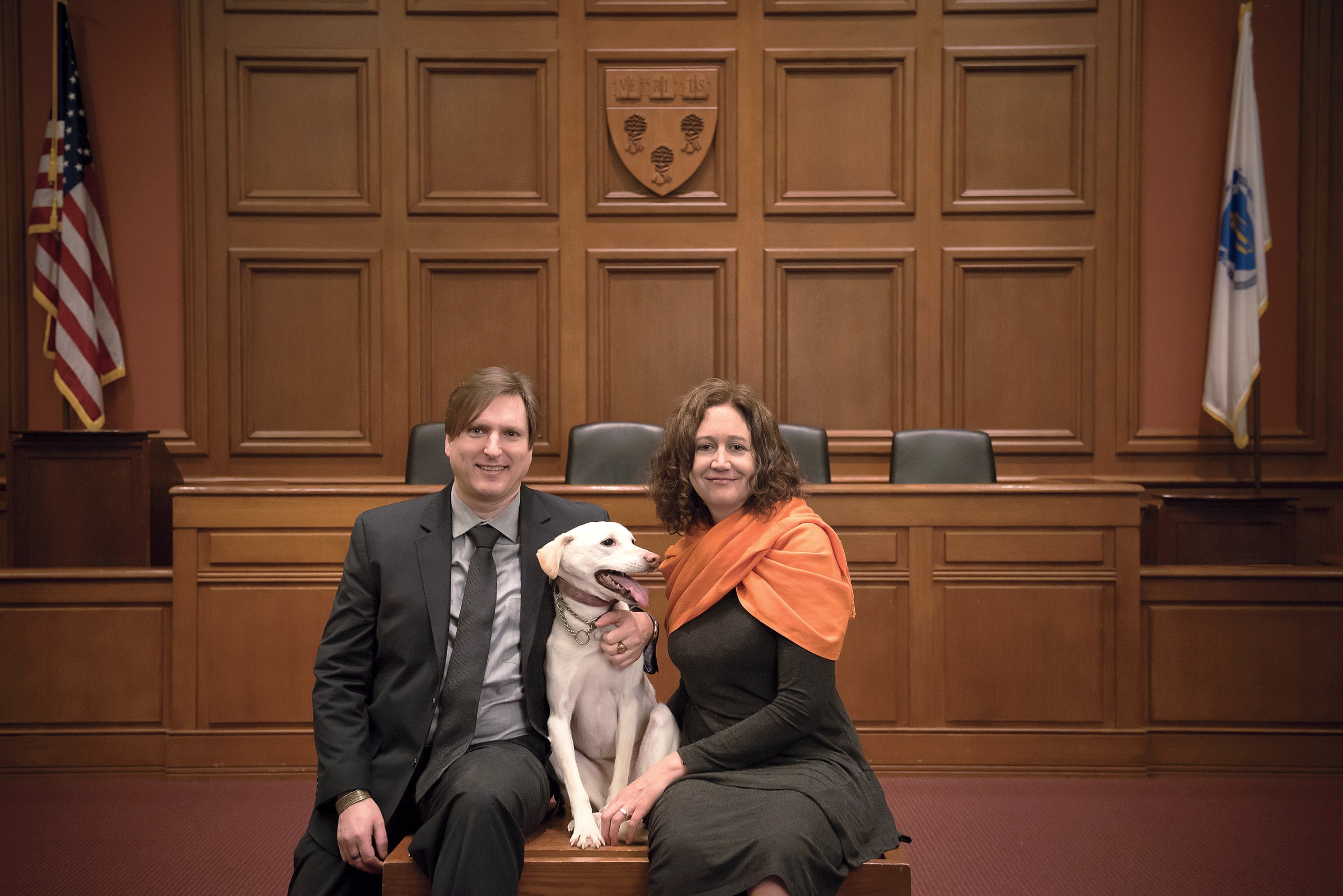What do Islamic law, direct democracy, and environmental law have in common? These topics were among the issues explored during Animal Law Week, a series of events hosted at Harvard Law School from February 15-21 by HLS’s Student Animal Legal Defense Fund (SALDF), the Animal Legal Defense Fund (ALDF) and the Harvard Animal Law & Policy Program.
The weeklong series featured lunch talks by a range of animal law advocates and scholars. At the end of the week, students from law schools across the country participated in three days of National Animal Law Competitions.
Professor Kristen Stilt led the first lunch talk, entitled “The Women’s Movement, Animal Welfare, and Islamic Law: Constitutional Animal Protection in Egypt.” In addition to running Harvard’s new Animal Law & Policy Program, Stilt serves as co-director of the Islamic Legal Studies Program. Stilt created the “Animals, Law & Religion Project,” which studies how religious practices around the world affect animal welfare.
Making animals more visible to the law
Harvard Magazine recently featured a story on the evolution of animal law in the United States, highlighting the new HLS Animal Law & Policy Program and faculty director Kristen Stilt. At the moment, says Stilt, the law remains unwavering: animals are property—albeit with certain protections. “It’s part of what makes this field fascinating,” she says. “We know how law doesn’t work for animals, but we have no clear idea yet about how it should.” Read Are Animals “Things”? at Harvard Magazine.
In another talk, David Wolfson, a partner at Milbank, Tweed, Hadley & McCloy, explained that while he specializes in corporate mergers and acquisitions, he has developed deep pro bono experience representing groups such as the Humane Society and Farm Sanctuary in administrative challenges, litigation, and legislation.
Wolfson spoke about how animal law reflects general trends in how modern social justice movements function. “It used to be when I was younger that you marched to Washington, you got a lot of people and you passed a federal law, and everything changed,” but that doesn’t happen anymore for a variety of reasons, Wolfson said, in part because activism has shifted to other tactics such as consumer pressure and social networking.
Another talk, on “Direct Democracy and Animal Protection,” featured discussion about animal protection ballot initiatives, led by Nancy Perry and Kelly Murray of the American Society for the Prevention of Cruelty to Animals (ASPCA). Perry began by acknowledging how emotionally difficult it can be for people who care about animal welfare to become experts in animal suffering in order to be effective advocates.
“One way to feel better about all of the horrors that animals face is to be a part of making change for them,” Perry said. “Even if it’s incremental and even if it’s small, it does help allay the way that experiencing knowing about their suffering makes you feel.”
Later in the week, Ingrid Newkirk, President of People for the Ethical Treatment of Animals (PETA), spoke to a packed room about human obligations toward animal rights. Another talk focused on animal abuse prosecution and featured Niki Caferri of the Queens County Animal Cruelty Prosecutions Unit and Scott Heiser of the Animal Legal Defense Fund (ALDF).
In an afternoon event co-sponsored by the Harvard Environmental Law Review, Florida A&M University College of Law Professor Randall Abate discussed what animal law can learn from environmental law, ways in which the movements are different, and ideas for how the two movements can collaborate.
From Friday to Sunday, HLS students volunteered and participated in the National Animal Law Competitions (NALC), which were organized by the Lewis & Clark Law School’s Center for Animal Law Studies. The inter-law school event featured three categories of competition: appellate moot court, closing argument, and legislative drafting and lobbying.
One year after Stilt joined the HLS faculty, the Animal Law & Policy Program under her direction is now in full swing. The Program—which is committed to facilitating scholarship, fostering discourse, and bridging theory and practice—introduced a new Wildlife Law class this past fall. Stilt is currently teaching a spring Animal Law class, and the Wildlife Law seminar will be offered again this fall.
One key feature of the Animal Law & Policy Program is its two-year, full-time residential fellowship. The Program’s first Academic Fellow, Delcianna Winders, began her term in August. Winders helped develop an Animal Law program at NYU Law School and she has published several scholarly works in the field.
Upcoming events sponsored by the Program include a comparative Workshop on Animals, Law, and Religion in May (co-sponsored by the Islamic Legal Studies Program), as well as an academic conference on The Animal Welfare Act at Age Fifty in the early fall.
